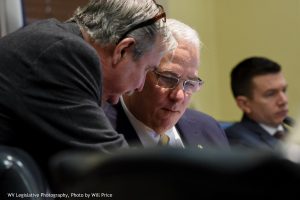CHARLESTON — The Senate Judiciary Committee on Friday began work on a bill that would have changed the number of magistrates in Monongalia, Preston and Marion counties.

The last major effort to make some kind of change to magistrate numbers flopped in 2015, and Friday’s work slowed as various senators chose to defend their magisterial turf. Work will resume next week.
But the committee did quickly pass a rules bundle that included what chair Charles Trump, R-Morgan, called a contentious rule dealing with the standards for pollutants in wastewater discharge. That rule has undergone twists and turns and Trump’s version forges a middle path he knows will satisfy no one but will keep the bill rolling through the Legislature.
Magistrate bill

Every county is entitled to two magistrates and current code requires the State Supreme Court to set the numbers for each county based mostly on population with some provision for caseload.
SB 261 proposes to set the number of magistrates in each county in code, in place of the somewhat convoluted wording allowing the Supreme Court to do it.
Among the changes in the introduced version, Mon County’s magistrate count would increase from four to five; Preston’s fall from three to two; and Marion’s from four to three.
That version didn’t come to the committee; instead, senators saw a committee substitute changing the numbers for only three counties: Putnam from three to four; Berkeley from five to six; and McDowell from three to two.
Janie Moore, director of the Supreme Court’s Magistrate Division told members that Berkeley needs more because its population is growing. McDowell needs fewer because its population is shrinking. Putnam needs more because it sits between the more populous Kanawha and Cabell and it’s seeing a dramatic increase in arrests for drug traffic between its neighbors.
Sen. Mark Maynard, R-Wayne, has McDowell in his district and posed a failed amendment to keep its count as is. Other senators then began suggesting they’re going to propose amendments for their counties.
Work had to halt for the morning floor session didn’t resume during the afternoon session. Trump said they’ll pick it up next week.
Sen. Bob Beach, D-Monongalia, said he’ll propose one to add a fifth to Mon.
As recently reported, Mon’s four magistrates handle about 2,500 cases each per year — a caseload among the highest in the state. Harrison’s five magistrates handle about 1,265 each. Kanawha’s 10 magistrates handle 2,160 each.
Part of assessing caseload is comparing types of cases: felony, misdemeanor, protective orders and so on. Failure to account for that was part of the reason 2015’s bill failed.
Water rule bill
Most of the Senate’s day was taken up with deliberations on amendments to the omnibus education bill, SB 451. But they paused for 15 minutes in late afternoon so Judiciary could briefly reconvene to quickly pass a Department of Environmental Protection rules bundle of eight rules bills.
It passed quickly without discussion. Among them was SB 167, dealing with waste discharge permits.
During its 2018 triennial review of that rule, DEP proposed in July to update the 60 water quality parameters within it for such pollutants as aluminum, arsenic, copper, barium and manganese – to conform to the most recent Environmental Protection Agency recommendations.
At the behest of industry, which wanted more time to evaluate the standards and develop more state- and site-specific measures for some of the 60, the joint Rule Making Review Committee in November removed the updated standards and kept the old ones.
Then last week the Energy, Industry and Mining Committee put the DEP-recommended standards back in.
On Friday, Trump said the rule’s twists and turns have angered both sides: industry and environmental.
So he had his staff amend the 60 new standards back out. The rule now directs DEP to propose updates no later than April 1, 2020, for consideration during the 2021 session. He also invited the environmental and industrial interests, along with DEP to submit comments and concerns on the rule as it now stands.
The rules bundle now heads to the Senate floor, then over to the House, where it could see more changes or pass through unscathed.
TWITTER @dbeardtdp Email David Beard at dbeard@dominionpost.com




